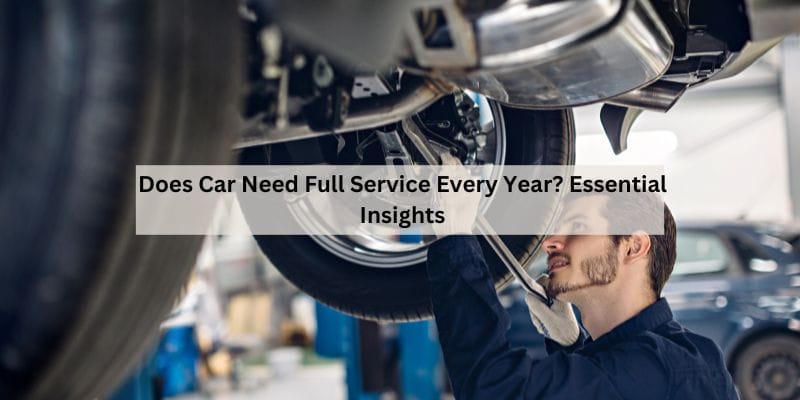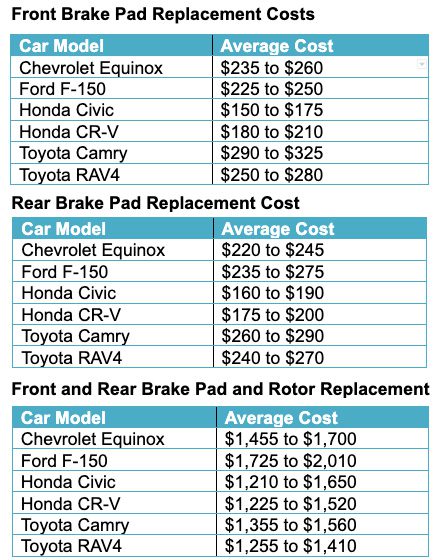Does Car Need Full Service Every Year? Essential Insights
No, a car does not necessarily need a full service every year. The frequency of car servicing depends on various factors such as the age, make, model, and mileage of the vehicle.
Regular maintenance is important to keep the car in good condition and prevent major issues, but the specific servicing requirements may vary. It is recommended to refer to the manufacturer’s guidelines or consult with a qualified mechanic to determine the appropriate service intervals for your car.
Introduction To Car Servicing
Regular car servicing is essential for maintaining the performance and longevity of your vehicle. By conducting full service every year, you can ensure that all critical components are inspected and maintained, reducing the risk of unexpected breakdowns and costly repairs. Engine oil, filters, brakes, tyres, and fluid levels are among the key aspects that need attention during a full service. Additionally, regular servicing can also enhance the resale value of your car and contribute to safety on the road.
Assessing The Need For Annual Service
Regular car maintenance is crucial to identify problems and keep the engine running smoothly. For low-mileage drivers, it’s essential to consider the frequency of service. While a typical car may require annual servicing, low-mileage cars might not need full service every year. It’s important to follow the manufacturer’s recommendations for maintenance schedules. Factors such as age, usage, and driving conditions play a significant role in determining the need for service. By assessing these factors, car owners can make informed decisions about the frequency of maintenance to ensure the vehicle’s optimal performance.
Scheduled Maintenance Vs. Full Service
Regular car maintenance is essential to ensure that it runs smoothly and efficiently. Scheduled maintenance involves basic checks and replacements, such as oil changes, tire rotations, and brake inspections, as per the manufacturer’s recommendations. It helps prevent breakdowns, prolong the lifespan of the vehicle, and maintain its resale value. On the other hand, full service involves a more comprehensive inspection, including engine diagnostics, fluid top-ups, and replacement of worn-out components. While it is not mandatory to get a full service every year, it is advisable to do so every 12,000 miles or 12 months, whichever comes first. Full service benefits include identifying potential issues, improving performance, and ensuring safety on the road. Therefore, it is important to understand the difference between scheduled maintenance and full service and to adhere to the recommended schedule to keep your car in top condition.
Impact Of Vehicle Age On Service Needs
When it comes to car maintenance, the service needs can vary based on the vehicle age. New cars typically require regular check-ups and maintenance to ensure optimal performance. On the other hand, older cars may need more frequent servicing and replacement of parts due to wear and tear. The age of the vehicle significantly impacts the maintenance schedule and the extent of service required. As a car ages, the need for comprehensive maintenance becomes more crucial to sustain its functionality and extend its lifespan.
Cost Implications Of Car Servicing
Regular car servicing is essential to keep your vehicle running smoothly, but a full service may not be necessary every year, depending on mileage and usage. While a full service incurs higher costs, it’s important to assess the specific needs of your car to determine the frequency and extent of servicing required.
| Question | Answer |
|---|---|
| What car maintenance is necessary? | Proper mechanical maintenance, including replacing spark plugs, drive belts, timing belts or chains, and changing air and fluid filters, is needed to identify problems and to keep the engine running as well as it should. |
| How often should a low mileage car be serviced? | As per the experts, a low mileage car should be serviced at least once a year. |
| What is a typical maintenance schedule for a car? | A typical car maintenance schedule includes regular oil changes, tire rotations, brake inspections, and fluid checks at specific mileage intervals. |
| What mileage should you service your car? | The service interval for a car varies depending on the manufacturer and model, but most manufacturers recommend a service every 12 months or 10,000 miles, whichever comes first. |
| How often do you get your car serviced by a mechanic? | Experts suggest that a car should be serviced every single year to ensure its smooth functioning and longevity. |
| Do you have to service your car annually even if you don’t drive much? | Yes, it is recommended to service your car annually even if you don’t drive much as it helps in identifying any underlying issues and keeps your car in top condition. |
| How often should I service my brand new car? | Most manufacturers recommend servicing a brand new car after the first year or 10,000 miles, whichever comes first. However, it is always better to check the manufacturer’s recommendations for your specific make and model. |
| Is it necessary to service my car every year if the mileage is low? | Yes, it is necessary to service your car every year even if the mileage is low as it helps in identifying any underlying issues and keeps your car in top condition. |
| How often should I get my car serviced? | As per the experts, a car should be serviced at least once a year. |
Common Misconceptions About Car Servicing
There is a common misconception that cars need a full service every year. In reality, the necessity of a full service annually depends on the car’s mileage and usage. It’s important to consult the manufacturer’s recommendations and consider the specific needs of your vehicle before committing to an annual full service.
| Question | Answer |
|---|---|
| What are the common misconceptions about car servicing? | Many people believe that their car needs a full service every year, but this is not always necessary. Another myth is that servicing your car at a dealership is more expensive than going to an independent garage. However, this is not always the case. |
| What do you really need to know about car servicing? | Proper mechanical maintenance is necessary to identify problems and keep the engine running smoothly. This includes replacing spark plugs, drive belts, timing belts or chains, and changing air and fluid filters. However, the frequency of servicing depends on the age and mileage of your car, as well as the manufacturer’s recommendations. |
| How often should you service your car? | Most manufacturers recommend servicing your car every 12 months or 12,000 miles, whichever comes first. However, this can vary depending on the make and model of your car, as well as how you use it. Always refer to your owner’s manual for specific recommendations. |
Real-world Experiences With Car Service
Regular car servicing is crucial to maintain the performance and longevity of your vehicle. Most car owners recommend getting a full service every year to ensure that all essential components are checked and maintained properly. According to automotive experts, this regular service helps identify any potential issues early and prevent major mechanical problems in the future. Moreover, stories from car owners also highlight the importance of annual servicing in maintaining the reliability and safety of their vehicles.
Making An Informed Decision
Proper mechanical maintenance, including replacing spark plugs, drive belts, timing belts or chains, and changing air and fluid filters, is needed to identify problems and to keep the engine running as well as it should. However, when to opt for full service depends on various factors such as the age of the car, mileage, driving conditions, and manufacturer recommendations. Creating a personalized service schedule based on these factors can help you make an informed decision and ensure that your car receives the necessary maintenance it needs. It is important to note that regular maintenance is crucial for the longevity and performance of your car, and while full service every year may not be necessary, it is recommended to have your car serviced at least once a year.
Frequently Asked Questions
What Car Maintenance Is Really Necessary?
Proper mechanical maintenance is necessary for your car. This includes replacing spark plugs, drive belts, timing belts or chains, and changing air and fluid filters. Regular maintenance helps identify problems and keeps your engine running smoothly. Remember to follow the manufacturer’s recommended schedule.
How Often Should A Low Mileage Car Be Serviced?
Low mileage cars should be serviced at least once a year. Regular maintenance is important to ensure the vehicle is in good working condition and to prevent potential problems. By following the recommended service schedule, you can keep your low mileage car running smoothly and extend its lifespan.
What Is A Typical Maintenance Schedule For A Car?
A typical maintenance schedule for a car includes regular replacement of spark plugs, drive belts, timing belts or chains, and changing air and fluid filters. This helps identify and address any potential issues and keeps the engine running smoothly. It is recommended to service your car annually or every twelve months.
What Mileage Should You Service Your Car?
Your car should be serviced once a year to ensure proper maintenance and identify any potential issues. Regular servicing, including replacing spark plugs, drive belts, timing belts or chains, and changing air and fluid filters, is necessary to keep the engine running smoothly.
By following this schedule, you can help extend the lifespan of your vehicle and avoid costly repairs in the long run.
Conclusion
Regular maintenance is essential for keeping your car running smoothly and preventing major issues. While a full service every year may not be necessary for all cars, it is recommended to follow the manufacturer’s guidelines and have your car serviced at least once a year.
This will help identify any potential problems and ensure that your car remains in optimal condition. Remember, proper maintenance is key to extending the lifespan of your vehicle and avoiding costly repairs down the road. So, don’t neglect the importance of regular servicing for your car’s overall health and performance.







